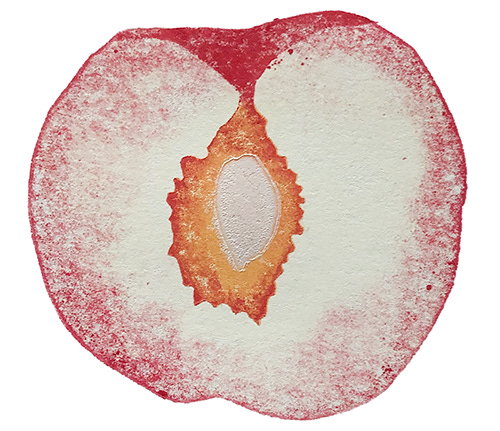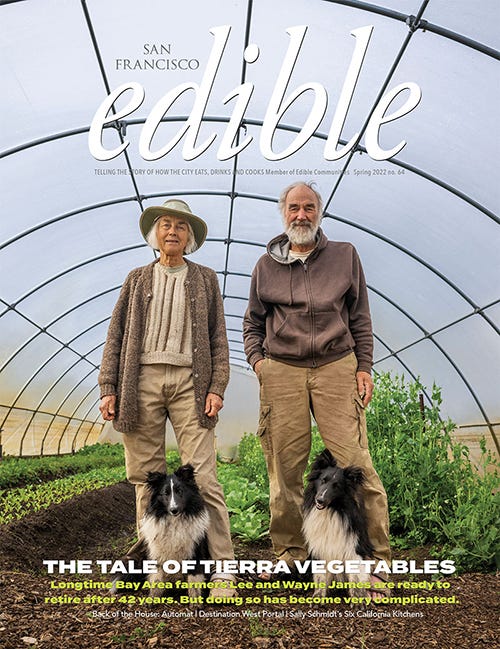Hello!
CATCH-ALL
Mother Dear, never apologize for nettles I yanked in fury from Lottie Shoop’s side yard — they stung me into seeing fairy mosses lilypad her middened juniper, the quivering gobble of her chin, teacup clicking dentures as she sprang up into her wattle hut and broke a rib of aloe vera — gel belling the top of that claw goblet. It didn’t cool the sting, and yet, noticing sunshine thumbing plums in a string catch-all — I was already well.
—Danielle Chapman, from Poetry 2017
We have a limited number of monthly subscriptions for our May 2022 print of a Snow Angel Peach. This edition was printed by hand, and each has its own unique coloration—no two are the same. The peaches we purchased at the farmers market had split pits when we cut them in half, revealing the noyau (used to make bitter almond extract). Click here for more info on the variety.
Have you picked up a copy of our latest issue yet?
Do you own a small business in the city? We’d love to give you a stack of complimentary copies of the spring issue for your customers. Ping us at ediblesanfrancisco@gmail.com, and we’ll drop some off.
Are you a business owner in the city that wants to reach our devoted readers with an ad in the magazine? Did you know:
Edible readers spend a remarkable 59.4 minutes with each issue and what they like best about the magazine is “that it’s local.”
72% of readers pick up their copies of Edible at local businesses.
96% of readers said they would likely patronize a restaurant mentioned in Edible.
63% of readers have read at least 3 of the last 4 issues.
By the way, I'm Bruce Cole, Publisher of Edible San Francisco. If you’re new here, welcome to EAT.DRINK.THINK., a newsletter spotlighting seasonal recipes (like Cracked Freekeh Salad with Spring Peas), the latest SF Bay Area food news, poetry (scroll back up if you skipped over this week’s poem), and more!
👉 ICYMI: The most-clicked link from last week’s newsletter was the cover story for our spring issue: The Tale of Tierra Vegetables.
Do you know someone who is looking for a career in broccoli breeding (it’s a thing!)? Send them this newsletter!
‘Tis Nettle Season Afterall: Mollie Watson’s Nettle Soup with Horseradish Cream is a right of spring for us. Edible Communities
Hawaiian Furikake Salmon: We’re somewhat of a purist when it comes to cooking salmon; it’s pan-fried, skin-side down until crisp (is the skin the best part 🤔), and a quick flip to finish the other side. That’s it. But this recipe for Hawaiian Furikake Salmon caught our eye since we do have a few different furikake mixes in our pantry (not enough, though!), and we love anything with Kewpie mayo, so we’re going to give it a go. This recipe via Taste, is simply:
Sprinkle ¼ cup furikake on salmon.
Spread mayonnaise mixture over salmon entirely, and evenly pour remaining furikake over the fish.
Bake for 10-12 minutes.
Related: Forget Everything bagel seasoning; furikake is the blend of the moment that supercharges everything from crudité to spaghetti.
Salmon and Rice: The Nigiri Project. Rice Farmer John Brennan is collaborating with scientist Jacob Katz to turn the Yolo Bypass (Sacramento Valley) into a floodplain that baby Chinook salmon can overwinter in as they make their way down the delta to the Pacific. They are flooding the rice fields after harvest, so the stalks will decompose, in turn making nutrients available to bugs/plankton to serve as food for the growing salmon. The New York Times
Related: Fish in the Fields (FIF) targets California’s 500,000 acres of flooded rice fields to produce a new source of protein while cutting methane emissions from rice cultivation.
#Salmon Protip: Do you want to pay less than $35-45/lb for salmon at retail? A quick jaunt (20 minutes) down Highway One to the Pillar Point Harbor and the Princeton Seafood Co., you can get a whole salmon for $18/lb (they’ll cut it up for you). Just freeze the filets in ziplock bags, and you’re set. Or download the Fishline app and purchase salmon directly off the boat.
Got Milk? Dairy producers have lobbied the FDA to prohibit the use of the word milk for plant-based, uh, milk. And it looks like that’s going to happen. Mother Jones
Got Meat? Plant-based meat is not the savior you may think it is.
“Consumers may think they are ’voting with their dollar’ by choosing plant-based meats, but most of that dollar lines the pockets of agribusiness giants, including the largest meat companies,” says Amanda Starbuck. Food & Water Watch
Got Followers? First-time cookbook writers need a healthy number of social media followers to secure a book deal since publishers offer little to zero promotion once the book is published. “First-time cookbook deals are often in the four- or low-five-figure range; in general, for the publishers, the aim is to secure a 10 percent profit on book sales.” Eater
Got Tomatoes?


Got Ducks? Sadly, the Hing Lung Meat Company in SF’s Chinatown (and their to-go service, Go Duck Yourself), known for their crisp-skinned pork and roast duck, has closed. Due to an avian flu outbreak, their duck supplier in Pennsylvania had to exterminate its entire population of Pekin ducks. Since the restaurant sells 400-500 roast ducks a week, which accounts for half of their business, and no other suppliers can step in to provide that number, they have temporarily closed until the grower can establish their flock. KQED
Got Sake? We always have at least 3-4 bottles on hand, usually nama (unpasteurized) varieties, in the fridge. Craft sakes are just as food-friendly as the wines we tend to drink, which are mostly natural and low ABV. The U.S. is Japan's leading export market for craft sake, and there are plenty of places to find a knowledgeable salesperson to help you choose a bottle in SF. We recommend True Sake and Millay for starters. For Civil Eats, Twighlight Greenaway talked to Nancy Masumoto about her new book Exploring the World of Japanese Craft Sake: Rice, Water, Earth:
“Sake embodies some of the things I love most about Japan: the contrast between old, traditional ways and endlessly imaginative reinvention, and an intense dedication to craft. Sake’s identity is inseparable from the country’s history, culture, and language.”
There is also great craft sake brewed locally, including Sequoia Sake in SF and Den Sake in Oakland.
LISTEN On repeat this week: “The Couple Across The Way” by the Fontaines. Watch it on NPR’s Tiny Desk Concert via YouTube.
We’re outta here. Be well and take care,
–Bruce
Do you follow us yet?
Instagram: 25K+ followers
Twitter: 52K+ followers
Facebook: 6500+ followers
In case you somehow missed that subscribe button:
"Despite its artistic intentions and its many accomplishments, humankind owes its existence to a six-inch layer of topsoil and the fact that it rains." —Anonymous







Coolio!